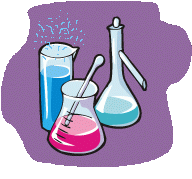


Description of experiment
Below follows a plain text transcript of the selected experiment.
![]()
Needed compounds:
-----------------
hydrochloric acid : HCl
hydrogen peroxide : H2O2
sodium hydroxide : NaOH
sodium bicarbonate : NaHCO3
manganese (II) sulfate : MnSO4 . H2O
Class:
------
elem=Mn
precipitation
redox
Summary:
--------
Manganese (II) forms a white precipitate with bicarbonate, while slowly
developing a gas (probably this is CO2). This precipitate is not quickly
oxidized by oxygen from the air. When the precipitate is made more alkaline
by adding hydroxide, then it is oxidized fairly quickly. Addition of
hydrogen peroxide causes immediate oxidation of the alkaline precipitate.
Description:
------------
Add a solution of sodium bicarbonate to a solution of manganese sulfate: A
white precipitate is formed. The liquid slowly starts bubbling. When it is
shaken, then the bubbling becomes a little faster.
Add a solution of sodium hydroxide: The bubbling immediately stops, the color
of the precipitate shift from pure white to a little bit dirty white (a yellow/
brown hue can be observed). Near the surface of the liquid, the precipitate
turns brown.
Add a few drops of hydrogen peroxide (10% by weight): The precipitate turns
dark brown.
Add an excess amount of hydrochloric acid (10% by weight): A lot of gas is
evolved (from the bicarbonate, CO2) and a compact dark brown (almost black)
solid remains, which quickly settles at the bottom. This solid does not
dissolve in the strongly acidic liquid.
![]()